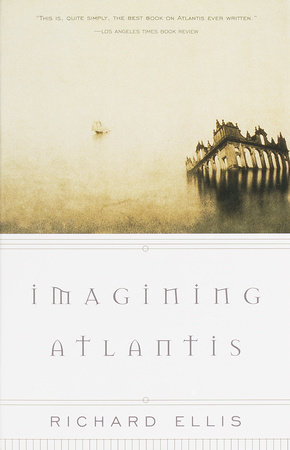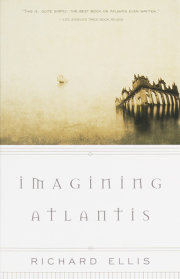WHAT PLATO SAID
Our records tell how your city checked a great power which arrogantly advanced from its base in the Atlantic Ocean to attack the cities of Europe and Asia. For in those days the Atlantic was navigable. There was an island opposite the strait which you call . . . the Pillars of Heracles, an island larger than Libya and Asia combined; from it travelers could in those days reach the other islands, and from them the whole opposite continent which surrounds what can truly be called the ocean. For the sea within the strait we are talking about is like a lake with a narrow entrance; the outer ocean is the real ocean and the land which entirely surrounds it is properly termed continent. On this island of Atlantis had arisen a powerful and remarkable dynasty of kings. . . .
--PLATO
TimaeusIt is of course impossible to know, or even guess, when men first looked out over the gray Atlantic and thought about crossing it. For eons, men had no idea what lay on the other side, or if indeed there was another side. In
The Edges of the Earth in Ancient Thought, James Romm wrote that "early writers seemed to have assumed, for lack of evidence to the contrary, that Ocean's waters stretched unbounded toward a distant horizon." The prospect of sailing out of sight of the comforting and familiar terra firma must have terrified the earliest sailors, and great credit must be assigned to the first of those brave navigators who ventured toward what must have seemed literally the end of the world. (While the story of Christopher Columbus's men fearing that they were going to sail off the end of the world if they kept going is certainly apocryphal--men have known the earth was round since Ptolemy's second-century calculations--they were unquestionably apprehensive as they sailed steadily toward the setting sun and the unknown.)
To the Greeks, the Pillars of Hercules--the name given to the twin rocks that define the passage we know as the Straits of Gibraltar--represented the gateway from the known Mediterranean to the unknown mysteries beyond. The poet Pindar wrote that the Pillars of Hercules were, almost literally, the end of the world: "Now Theron, approaching the outer limit of his feats of strength, touches the Pillars of Hercules. What lies beyond cannot be approached by wise men or unwise. I shall not try, or I would be a fool."
Before the year 1100 b.c., the Phoenicians, from their outpost at Carthage on the North African coast, had in all probability explored the shores of the Atlantic outside the protection of the Pillars of Hercules, that is, the Straits of Gibraltar. From archaeological evidence, it has been ascertained that the Carthaginians had established a trading post at Essaouira (modern Mogador), about six hundred miles south of Gibraltar on the Atlantic coast of Morocco, some twenty-five hundred years ago.
The first chronicler of an Atlantic voyage was Herodotus, the fifth-century b.c. Greek historian, who also mentions the first known map of the world, a bronze tablet "showing all the seas and rivers" compiled by his predecessor the historian Hecataeus. Also according to Herodotus, Pharaoh Necho II sent a Phoenician expedition to find a route around Africa. It will probably never be known if they completed the circumnavigation, but Herodotus's account (written some one hundred fifty years after the event) suggests that they may have done so:
Accordingly these Phoenicians set out and from the Red Sea sailed into the southern ocean. Whenever autumn came, they went ashore wherever in Africa they chanced to be on their voyage to sow grain in the earth and await the harvest. On reaping the new grain they put again to sea. In this wise, after two years had elapsed, they rounded the Pillars of Heracles and in the third year reached Egypt. Now they told a tale that I personally do not believe (though others may, if they choose), how they had the sun on their right hand as they sailed along the African coast.
Although some analysts of Herodotus have been inclined to question this account, the statement "they had the sun on their right hand," which would refer to the sun's midday position only if the Phoenicians were sailing west while south of the equator, actually supports the claim for authenticity. Naval historian Samuel Eliot Morison believes they succeeded, and called their circumnavigation of Africa from east to west "one of the most remarkable voyages of history." In
Beyond the Pillars of Heracles, which contains a meticulous analysis of Herodotus's account, the historian Rhys Carpenter wrote, "The curious detail that Herodotus refused to believe this becomes our surest warrant for believing the Phoenician claim that they circumnavigated Africa."
A century or so later, Hanno, the magistrate of Carthage, set out from the Mediterranean and sailed south with "sixty ships of fifty oars each and a body of men and women to the number of thirty thousand," which works out to approximately five hundred persons per ship, an obvious exaggeration. This story can be found in the
Periplous of Hanno, a Greek translation of an inscribed tablet that has never been found. The narrative tells of the establishment of several colonies along the Atlantic coast of Africa, to safeguard the Carthaginian access to the Canaries and Madeira, the sources of the Murex snails that provided the royal purple dye. Hanno passed the Saharan coast, and easily made Cape Bojador, which was to prove such a formidable psychological and physical obstacle to the first Portuguese explorers. The success of this pioneer voyage can be found in Hanno's own narrative, where he describes a tribe that he calls "Ethiopians," various active volcanoes, and also such exotic animals as elephants, hippopotamuses, and "gorillas" (probably chimpanzees--the expedition killed three females and brought the hairy pelts back to Carthage). This coast of Africa would not be seen again by European eyes for another thousand years, when sailors from Portugal would cautiously navigate south around the bulge of Africa, culminating in Bartholomeu Dias's doubling of the Cape of Good Hope in 1488.
In the
Timaeus, Plato tells us that Solon (630-560 b.c.) reported that the Egyptian priests of Saïs told him the story of a great island that lay in the Atlantic Ocean, just off the Pillars of Hercules. Its generals mounted an invasion of Greece: "Our records tell [Plato wrote] how your city checked a great power which arrogantly advanced from its base in the Atlantic ocean to attack the cities of Europe and Asia."
The invasion ended not in a military victory for either side but in a double defeat, where the only winner was the force of nature:
"But afterward there occurred violent earthquakes and floods, and in a single day and night of misfortune all your warlike men in a body sank into the earth, and the island of Atlantis in like manner disappeared in the depths of the sea" (my emphasis). This is the full extent of the original story of the destruction of Atlantis.
With Socrates and Aristotle, Plato is considered one of the authors of the philosophical foundations of Western culture. He was born in 428 b.c., either in Athens or in Aegina, to Ariston and Perictione. We know few details of his life, but after the suicide of his mentor Socrates in 399 b.c., he became disillusioned with Athens and traveled in Greece, Italy, Egypt, and Sicily, and when he returned to Athens, he founded an academy dedicated to the systematic pursuit of philosophical and scientific research. Around 368, when he was forty, Plato was invited to Sicily to educate Dionysius II, but the experiment was a failure and Plato returned to Athens. Rather than adopting the role of "philosopher-king" that Plato had recommended in
The Republic, Dionysius II became a reckless tyrant. In addition to
The Republic, the best-known and most influential of the dialogues, Plato wrote the
Timaeus and the
Critias, in which the story of Atlantis is first told. Although not dated, the
Timaeus has long been regarded as one of his last works. In
The Laws, left unfinished at his death in 347 b.c., he apparently had not completely abandoned the idea of an ideal government, for he recommended the association of a young and high-spirited prince with a wise lawgiver.
"The works of Plato," wrote A. E. Taylor in his seminal study of the philosopher's life and thought, "have come down to us absolutely entire and complete." The manuscripts were preserved at the Platonic Academy, and thence in the great library at Alexandria. Copies of the manuscripts were carefully made from the Middle Ages to the present day, so there is no reason to doubt Plato's authorship.
Plato's dialogues contain the only reference in the whole of ancient literature to the disappearing island of Atlantis, and no further mention is made of this story until other people begin quoting Plato. (Not even Herodotus mentions the story, and he is said to have spoken directly with the priests at Saïs, the very priests who passed the story to Solon.) There are people who take everything he said literally (even though they are unable to locate the missing island), and others who dismiss the whole story as "science fiction." Others categorize it as a fictional account that Plato introduced to demonstrate what an ideal society might be like.
But did Plato make up
everything about Atlantis? Perhaps not. As with all writers of fiction, he was probably influenced by people and events that he knew, even though he may have modified them beyond recognition. Romm suggests that there was a text circulating in Plato's time that was called
On Marvelous Things Heard, which contained elements that Plato might have incorporated:
They say in the sea outside the Pillars of Hercules an unidentified island was discovered by the Carthaginians, many days' sail from shore, which has all kinds of trees, and navigable rivers, and a marvelous variety of other resources. When the Carthaginians began going there often on account of its fruitfulness, and some even emigrated there, the Carthaginian leaders decreed that they would put to death anyone who planned to sail there, and got rid of all those who were living there, lest they spread the word and a crowd gather around them on the island which might gain power and take away the prosperity of the Carthaginians.
Did the Carthaginians actually know of such an island? Probably not, any more than Plato did. Romm quotes Diodorus as suggesting that the Carthaginians wanted to keep the island a secret so they could escape to it if necessary. Furthermore, Diodorus believed that the Pillars of Hercules had been closed in ancient times to prevent "sea monsters" from entering the Mediterranean, and that therefore nobody could get out, Atlantis or not.
Another aspect of Plato's discussion of Atlantis is found in the
Critias, where he describes the nature of the island's civilization before its destruction. Here we might find some indication of what Plato actually had in mind, for he describes a fanciful civilization, replete with boundless natural riches, "which then lay open to the sun, in marvelous beauty and inexhaustible profusion." The royalty of Atlantis were enormously wealthy ("they possessed wealth such as had never been amassed by any royal line before them"), perhaps because they were able to mine the mineral orichalch, which had a higher value than any other substance except gold. The forests and pastures were exceptionally bountiful, and "the earth bore freely all the aromatic substances it bears today, roots, herbs, bushes and gums exuded by flowers or fruit," and there were two springs, a cold and a warm, and "the supply from both was copious and the natural flavor of their waters remarkable." Man-made structures included temples, gymnasiums, and dockyards, all in excellent order. Since this description fits no known land, and since the plains, the forests, the waters, and the city are so sumptuous, it seems not unreasonable to conclude that Plato was describing a mythical utopia, and that to explain its disappearance, he invented a great natural catastrophe. The area of the Mediterranean in which Plato lived is occasionally subjected to geological misadventures--sometimes on a colossal scale--so it is not surprising that he would have employed such a device. Future Atlantologists would attempt to fit Plato's description into almost every political and geological system known, with varying degrees of success.
Later students of the Atlantis story have pointed out that it is curious that no other ancient historians made reference to Atlantis, except, of course, to quote Plato. In his 1978 essay on the historical perspective regarding Atlantis, J. Rufus Fears wrote, "In the absence of any evidence from the Egyptian sources, the silence of Thucydides, Herodotus, Isocrates, and Aelius Aristedes seems conclusive. Plato's story does not reflect a historical tradition derived from Egypt or Solon or from anywhere or anyone else. It is a poetic invention of Plato." Moreover, its hypothetical location has not always remained just outside the Straits of Gibraltar, but has wandered from the Canary Islands to the Sahara Desert, Scandinavia, and Palestine, most recently coming to rest on various Aegean islands, especially Santorini and Crete.
. All rights reserved. No part of this excerpt may be reproduced or reprinted without permission in writing from the publisher.









